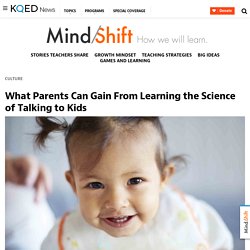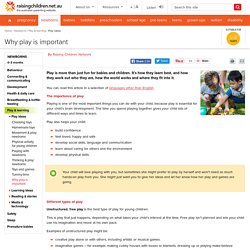

How young children learn English as another language. By Opal Dunn, educational consultant and author Introduction Young children are natural language acquirers; they are self-motivated to pick up language without conscious learning, unlike adolescents and adults.

They have the ability to imitate pronunciation and work out the rules for themselves. Any idea that learning to talk in English is difficult does not occur to them unless it’s suggested by adults, who themselves probably learned English academically at a later age through grammar-based text books. Read the notes below about young children learning English as another language. What Parents Can Gain From Learning the Science of Talking to Kids.
The widening education gap between the rich and the poor is not news to those who work in education, many of whom have been struggling to close the gap beginning the day poor children enter kindergarten or preschool.

But one unlikely soldier has joined the fight: a pediatric surgeon who wants to get started way before kindergarten. She wants to start closing the gap the day babies are born. When Dr. Patricia Kuhl: The linguistic genius of babies. Singing phrases.
Let's Talk. What do babies need in order to learn and thrive? One thing they need is conversation — responsive, back-and-forth communication with their parents and caregivers. This interactive engagement is like food for their developing brains, nurturing language acquisition, early literacy, school readiness, and social and emotional well-being. A dispiriting number of children don’t get that kind of brain-fueling communication, research suggests. In early childhood policy (and in the wider media), much attention has been paid to the so-called word gap — findings that show that low-income children hear 30 million fewer words, on average, and have less than half the vocabulary of upper-income peers by age three.
But putting that alarming number in the spotlight obscures a more critical component of the research, says Harvard Graduate School of Education literacy expert Meredith Rowe: it’s not so much the quantity of words but the quality of the talk that matters most to a child’s development. Quality over quantity. Quality over quantity 2. How to speak and when. How do you speak 'Motherese'? Deb Roy: The birth of a word.
Books to read.
Psychiatric Outcomes in Young Children with a History of Institutionalization. Playing. Lynne Murray Psychology of Babies (1) Books. Attachment Part Two: Patterns of attachment. In part one of our multi-part series on attachment, we saw how attachment patterns develop in the infant- caregiver relationship to meet the infant's powerful need for comfort and security.

In this second feature, Dr. Goldberg provides a detailed description of the various patterns of attachment in infancy. By Susan Goldberg, PhD Through careful observation of mother-infant pairs in naturalistic settings, Mary Ainsworth noted differences in the way infants moved away from their mothers to explore and then returned for reassurance and affection. These observations gave rise to the concept of the secure base. Melancholy Baby. 8 Things to Remember about Child Development - Center on the Developing Child at Harvard University. Brain development. The Science of Neglect The Persistent Absence of Responsive Care Disrupts the Developing Brain. InBrief The Science of Neglect 3. Interview with Arietta Slade Pt1.
Nate Ramsayer - Center on the Developing Child at Harvard University. Marked mirror ing and mind mindedness. 2014 Vingsted Artikel Arietta Slade Slade Parental. Bruce McEwan Transcript. Child in mind2. Begin before birth. Barlow Glover Psychological Adversity pregnancy. Interview with Vivette Glover. Interview with Arietta Slade Pt1. Interview with Sue Gerhardt Pt2. Learning through play ey. Importance of play for babies & children. Play is more than just fun for babies and children.

It’s how they learn best, and how they work out who they are, how the world works and where they fit into it. You can read this article in a selection of languages other than English. The importance of play Playing is one of the most important things you can do with your child, because play is essential for your child’s brain development. The time you spend playing together gives your child lots of different ways and times to learn. ZERO TO THREE. Additional video info baby in mind. Glossary baby in mind. Further readingfot Baby in mind. Review of the Course. What is VIG. Interview with Hilary Kennedy. The Theory behind infant parent psychotherapy v2 1. Mindful Hypnobirthing Downloads. Interview with Tessa Baradon Pt2.